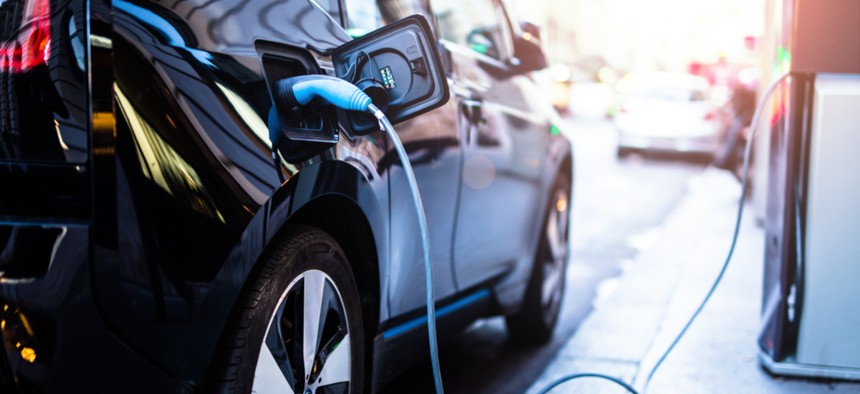Utilities Are Paying Their Customers to Buy Electric Vehicles

guteksk7/Shutterstock.com
The transport sector may be the only major new source of electricity demand for developed economies.
Electricity utilities were never designed for a world in which electricity demand didn’t go up forever.
For a century, that was fine. But after 2005, U.S. demand leveled off and, in some regions, began to decline. The Tennessee Valley Authority is now preparing for an unprecedented 13% drop in demand across the region it serves in seven states, Vox reports, the first sustained drop in the utility’s 85-year history.
As customers generate their own power from renewable sources, efficiency measures spread, and the economy sheds industrial customers, electricity providers are barreling toward bankruptcy. Economic growth no longer guarantees higher consumption.
Utilities scrambling to reinvent themselves are turning to electric vehicles. The transport sector may be the only major new source of electricity demand for developed economies. Bloomberg estimates that electrifying the U.S. light-duty fleet would add 774 terrawatt hours of demand to the grid, nearly the same as the entire U.S. industrial sector today. Globally, EVs are expected to drive electricity consumption up 300-fold by 2040, to about 5% of total consumption.
Utilities have made a halting entrance, so far, to this brave new world. Charging infrastructure is still evolving and unevenly distributed. Until recently, utility regulators hesitated to approve investments in charging infrastructure, to avoid leaving ratepayers on the hook for underused infrastructure. (This began to change in 2014, when California reversed course and began reviewing what is now more than $1 billion in new charging projects.) Utilities must also convince customers to adopt variable pricing that encourages off-peak charging, and “smart charging” technologies to manage load by responding to utilities’ calls for more or less energy automatically.
Only 21% of utilities provide such EV equipment right now. More people must buy EVs as well—and while the sector is rising fast, EV sales account for just 1% of new cars.
With few alternatives, utilities are spending their money (and carmakers’ cash) to get people hooked on batteries. The biggest enticements this year have come through Pacific Gas and Electric, Southern California Edison, San Diego Gas & Electric and New Jersey’s PSE&G. Utility customers can claim a $10,000 rebate (supplied by the carmakers) for a new BMW i3, reports Electrek, bringing the cost of the car down 54% to just $24,000 after state and federal incentives. Last year, Nissan teamed up with energy firms to offer similar deals.Vermont’s electric companies have offered up rebates of up to $1,200toward the purchase or lease of a new EV (although only a few customers have taken them up on it).
More common are charging incentives. Kansas City Power & Light launched a $20 million charging program for EVs in 2015, and Georgia is building its own charging stations. San Diego Gas & Electric has budgeted $45 million to build 3,500 charging stations by next year, as well as a $7.5 million for an education campaign to encourage EV sales in low-income areas. In Minnesota, Great River Energy is waiving premiums for people to charge their EV with wind power.
Showy promotions are new territory for utilities, but they’re a way to redefine their relationship with customers as more than a fixed-cost provider of electrons. “Think about it like telecom,” Dan Bowermaster, electric transportation manager for the Electric Power Research Institute, said in Midwest Energy News.“You offer free nights and weekends, free lunch time charging.”
From an electricity perspective, electric vehicles are essentially batteries on wheels. Millions of cars can act as a huge energy bank that stabilize the grid by drawing, or returning, electrons as needed once specialized charging technology is installed. Such services are still being tested, but a pilot program with Nissan and the Italian power company Enel in Denmark already returns about €1,300 (about $1,530) per year for each vehicle resupplying the grid. Eventually, utilities may enter the battery business themselves: Deloitte predicts that utilities could lease EV batteries to fleet owners, and redeploy them as stationary storage when their capacity declines.
For now, greenhouse gas emission targets, as much as worry about declining demand, is convincing government officials to green-light utilities’ EV investments. Funding to subsidize EVs has come from various public and private sources, although investor-owned utilities had not yet inserted the chargers into ratepayers’ bills as of mid-2017, reports Scientific American. That’s due to change. Utilities are asking regulators to recognize their investments in EV awareness campaigns and incentives as part of their core infrastructure (regulated utilities must secure government approval to earn a fixed rate of return on their infrastructure investments, since they cannot legally profit from selling the electricity itself). Once that happens, your utility company may start to resemble your car dealership and charging station as well.
There’s a lot of money at stake. The cost of accommodating the surge of EVs will run into the hundreds of billions of dollars globally by 2040. Delaying will prove expensive as well. Even plugging a few EVs into a neighborhood grid without careful management could drastically shorten the life of equipment such as transformers, costing thousands of dollars.
Yet the potential profits are even greater. In a world of falling electricity demand, utilities can now take billions of dollars in the transportation sector away from the fossil fuel industry. Politics, technology and economics are aligning to help them do that. “[Utilities] all want to eat the oil industry’s lunch,” says Max Baumhefner of the environmental group Natural Resources Defense Council. “So we’re happy to show them the way to the buffet.”





